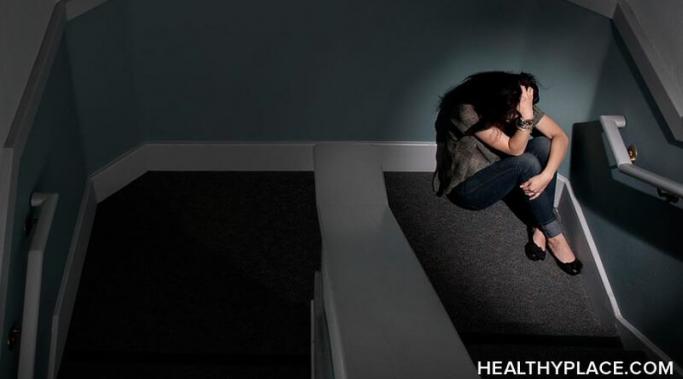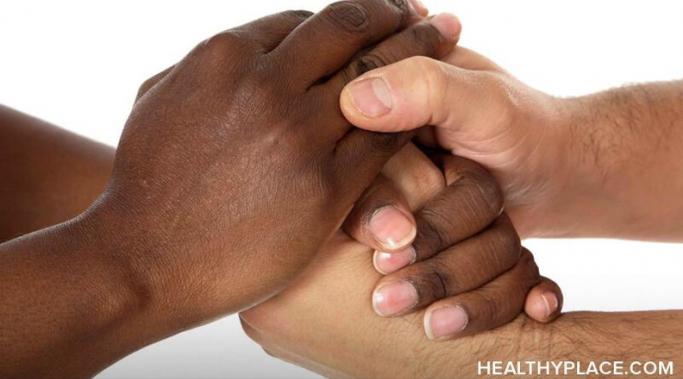I have spent many months of my life with an inability to feel pleasure - this is known as anhedonia. This means that no matter what happened, no matter how great it was, I couldn't feel happy about it. I couldn't feel happy at all. However, there is something I have learned about anhedonia, even without an ability to be happy, I can be thankful.
Coping
I talk about bi-polar disorder. As in, two poles - mania/hypomania and depression. The name is extremely descriptive.
But as it turns out, there is something in the middle (besides normalcy, whatever that is); it's called a mixed mood episode. Mixed moods possess distinct characteristics of both depression and mania. Mixed moods severely impair judgement and carry a significant risk of suicide.
We all have gut reactions to information. It's the reaction when our stomach knots or tumbles, our breathing quickens or stops, our eyes light up or look down. It's the reaction we have before realizing we're having a reaction.
And gut reactions around mental illness can be powerful. The problem is, our gut reactions are so often wrong about mental illness and mental illness treatment.
Recently, a man I have come to respect and care about attempted suicide. I am grateful he is still here to tell the tale. His suicide note was online and his pain was so evident it tore at my soul.
I was tremendously relieved to hear his friends had rescued him in time to save him. But I was then left with the problem as to what to say to this man. The last thing in the world I wanted to do was make the situation any more difficult for him.
What do you do when someone you care about just attempted suicide?
Last night I participated in the first tweetup for the Society of Participatory Medicine. In their words,
Participatory Medicine is a cooperative model of health care that encourages and expects active involvement by all connected parties (patients, caregivers, healthcare professionals, etc.) as integral to the full continuum of care.
Not surprisingly, this is something with which I firmly agree. I believe in patients as active participants in their own healthcare. I say it all the time - the doctors aren't the ones taking the pills, you are.
The issue with pushing for patient "participation" is not everyone is capable of wholly participating in their own healthcare. Sick people are busy being sick. They don't have time to read research papers.
While some in the tweetup agreed, two notable exceptions occurred:
""too sick"? -why Patient support groups are key took 4 building the 'plumbing'."
"One can't be busy getting well & busy being sick at the same time. The patient has to choose."
Sounds like blaming the patient to me.
I get asked quite a bit for specific treatment recommendations. People will tell me a few medication details and then ask what to do, or someone will ask what my experience has been on a certain treatment.
My answer is always the same: only your doctor is qualified to talk to you about your treatment as they know your personal history and health. My experience is only one person’s and cannot be generalized to any other person.
And that is the right answer. But unfortunately, it’s one people don’t want to give (or get).
A clear example is seen on Patients Like Me, a web site designed for patient-to-patient communication.
In the times when I've had prolonged periods of wellness, I don't particularly think about bipolar disorder and I don't feel its implications. I just get up, get out of bed, say 'hi' to my cats, and go about my day. True, the med-taking is a reminder, but bipolar isn't necessarily top-of-mind.
This does not mean, however, that I can forget about the bipolar disorder. Forgetting about bipolar disorder is one of the most dangerous things you can do.
I take a lot of flak for what I have to say about mental illness. My positions are often blunt and sometimes unpopular. This is fine with me. I’m an opinionated girl. Not everyone enjoys that particular charm.
But one thing that gets said every once in a while is I’m, “playing the victim.” And not only that, but I’m encouraging others to be victims. Contagious victim-ness I suppose.
This, of course, is just a slur designed to make me and others feel bad about what we have to say. Well, I say this:
Admitting to having a mental illness doesn’t mean you’re “playing the victim.” Talking about mental illness isn’t “playing the victim” either.
When I discovered I was bipolar, I suddenly became scared of everything. Things that never crossed my mind started to shudder through my bones and produce endless waterfalls of tears. I was afraid of diagnosis. I was afraid of what it meant. I was afraid of psychiatrists. I was afraid of treatment. I was afraid of not getting treatment. I was afraid of what the treatment would do to me.
Mental illness means being afraid.
I talk to many people who want to help a person with a mental illness. Often the people they want to help are loved ones who have just been diagnosed with a mental illness and those who want to help feel powerless.
The “helpers” have a hard job, but let me just say, we love you for it.


